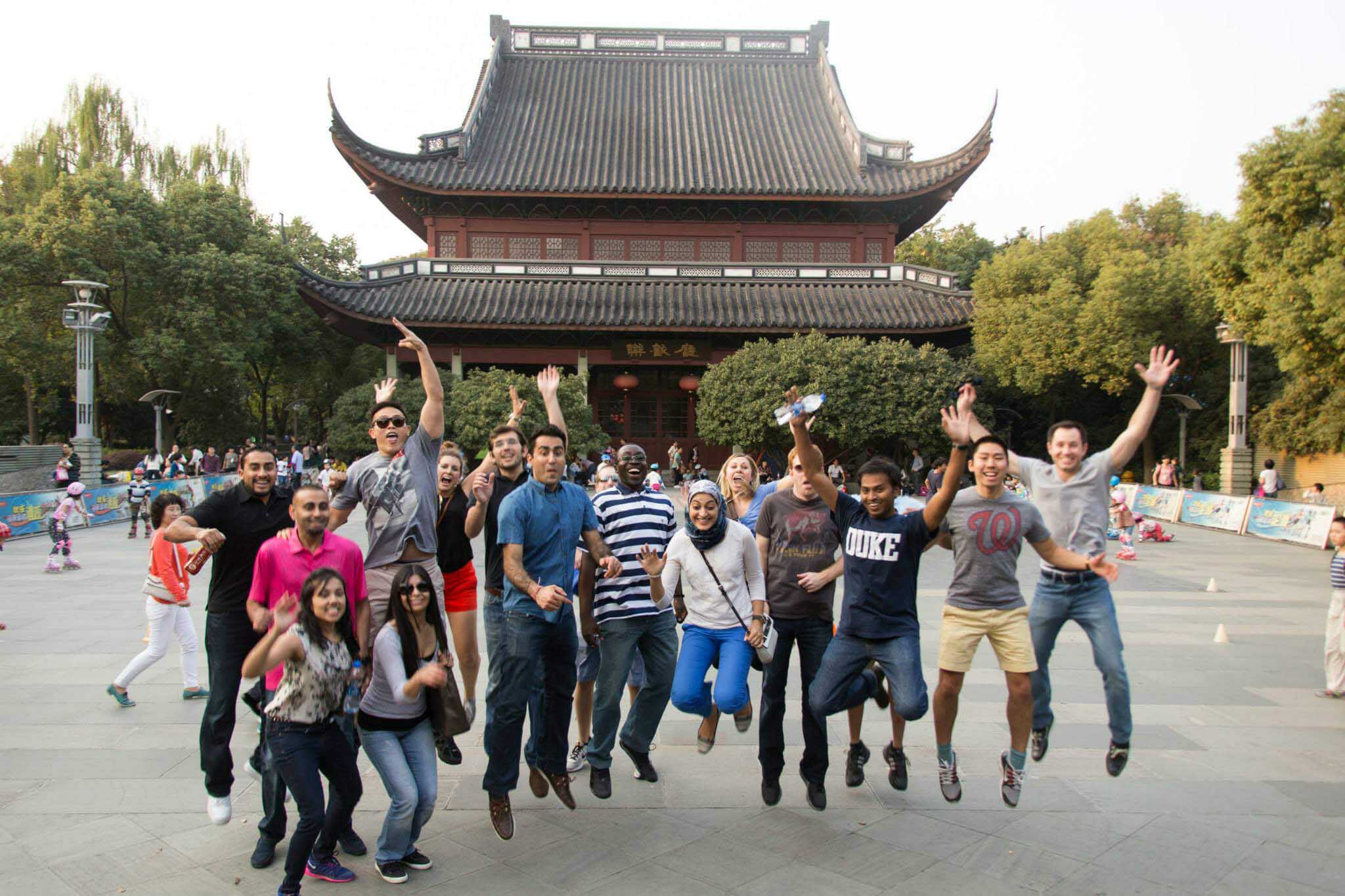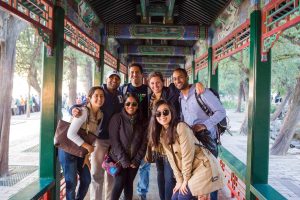Duke Global Executive MBA Student Blog

To the Great Wall and Back

This blog was written prior to the Cross Continent MBA program merger with the Global Executive MBA program.
To make the best of our residencies abroad, many of us often choose to do a pre- or post-residency add-on trip. In this case, 15 of us decided to visit Beijing and take in the culture and history of the Chinese capital for four days before traveling on to Shanghai for the start of class.
We were on our third day visiting Beijing, where one of our local classmates had organized a set of tours and activities for us to experience the “real” city. We’d all been given Chinese names—some more flattering than others—often using the last (or only) syllable of our first names and repeating it. These names ranged from “ni ni” meaning “very cute,” and “li li” meaning “very beautiful,” to “dan dan” meaning “egg egg.” We’d tried hot pots, Chinese breakfast fried dough, family style dinners and street food. We’d visited Tiananmen Square, the Royal Palace, and a local Tea House for a theater show. The next day’s agenda included a visit to the Great Wall, another one to a “Space Fruit” agricultural center (that one needs a whole blog of its own!) and in the evening we were meeting a Fuqua alumus—the head of supercharger development for China—for drinks.
 It had been the most amazing experience seeing the tourist attractions and the local hotspots all through the eyes of our local friend, and we could not have been more grateful for the opportunity to share this experience with such a great group. But as you’ll quickly realize during your residencies outside of your home country, for all the fascination, novelty and appreciation you may have for these cultures so different from your own, sometimes you just want a little taste of home—and that’s nothing to be ashamed of. With this desire in mind, we ventured into a McDonalds, recognizing it only by its tell-tale yellow “M” as the rest of the sign was entirely illegible to all but the couple of Mandarin-reading friends (for whom we will be eternally grateful!) in our group.
It had been the most amazing experience seeing the tourist attractions and the local hotspots all through the eyes of our local friend, and we could not have been more grateful for the opportunity to share this experience with such a great group. But as you’ll quickly realize during your residencies outside of your home country, for all the fascination, novelty and appreciation you may have for these cultures so different from your own, sometimes you just want a little taste of home—and that’s nothing to be ashamed of. With this desire in mind, we ventured into a McDonalds, recognizing it only by its tell-tale yellow “M” as the rest of the sign was entirely illegible to all but the couple of Mandarin-reading friends (for whom we will be eternally grateful!) in our group.
The members of our traveling group of friends stemmed from around the world, representing four different continents, but we all agreed: McDonalds is the same everywhere! Right?
Wrong, McDonalds is not the same everywhere. Where were the numbered menus? And the Supersize option? And they had less than half the menu items they have in our home countries!
“Good thing the International Investment Club invited Mr. Wei-King Ng, who’s in charge of McDonald’s menu strategy for China, to be a guest speaker next week in Shanghai,” remarked one of our group members. “I am very curious to ask him about the menu strategy here in China!”
Well, it turns Wei-King is not just in charge of menu strategy for China. He is the vice president of strategy and insights for McDonald’s China and also happens to be the former senior director of menu strategy for McDonald’s Global. Wei-King is a Fuqua Daytime MBA from the class of 2005, and worked at Accenture and Boston Consulting Group before being headhunted by McDonald’s.
Wei-King joins us on a Sunday evening, dressed casually in jeans, a polo shirt and a sweater. From his laid-back manner and the casualness in his interactions with us one would never guess that he is a top dog of one of the biggest foreign brands in China. But then I realize, perhaps he is so casual because he considers us part of his network, people who have something in common with him. He must truly value Duke and his Fuqua education, because he is honoring us with a significant amount of his very precious free time to speak about his experience developing McDonald’s into a top-10 foreign brand in the Chinese market.
He begins with a short overview of the “forces of change in China” which include the new leadership, the digital age and explosive urbanization, reconfirming all of the theoretical information we picked up in the pre-residency reading for our Cultures, Civilizations and Leadership multi-term course. He follows up with more details about the changing demographics of the market: Happy Meals and the toys they come with are a very big differentiator for McDonald’s compared to other similar chains, such as its arch-nemesis in China—KFC. The one-child policy in China, however, reduces the impact and advantages of this differentiator in the Chinese market. He talks about the different financial strategies in the different markets, and immediately The Economist’s Big Mac Index, which was developed as an informal measure of purchasing power parity around the world, pops into mind. How can the Big Mac Index be accurate if McDonald’s pricing and margin strategy is different in each country? Perhaps that will be the subject of a reader’s letter to The Economist one day…
 This is just the tip of the iceberg of new experiences and knowledge I gained in my 10 days in China. I slept too little, ate too much, laughed too hard and still managed to fit in the required study time. It was a grueling 20 hours of flying to get there and my schedule didn’t slow down once I arrived, but it was worth all the effort.
This is just the tip of the iceberg of new experiences and knowledge I gained in my 10 days in China. I slept too little, ate too much, laughed too hard and still managed to fit in the required study time. It was a grueling 20 hours of flying to get there and my schedule didn’t slow down once I arrived, but it was worth all the effort.



